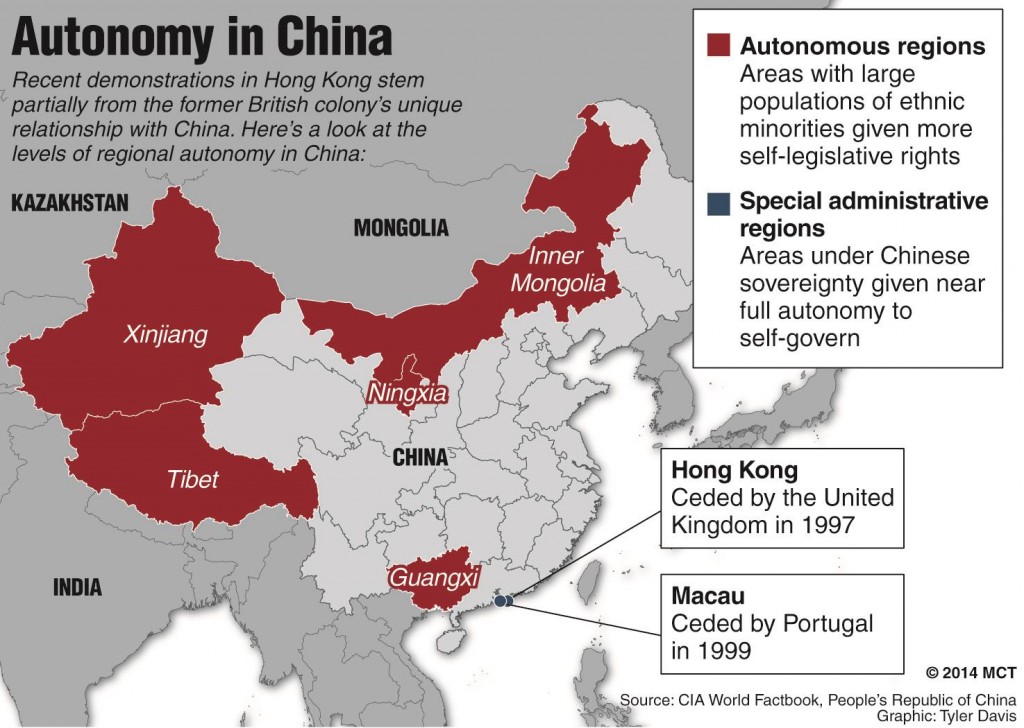Hong Kong Protesters Dig in Heels


 Hong Kong’s leader refused to meet with pro-democracy demonstrators by their midnight deadline Tuesday, despite their threats to expand the street protests that have posed the stiffest challenge to Beijing’s authority since China took control of the former British colony in 1997.
Hong Kong’s leader refused to meet with pro-democracy demonstrators by their midnight deadline Tuesday, despite their threats to expand the street protests that have posed the stiffest challenge to Beijing’s authority since China took control of the former British colony in 1997.
With tens of thousands of people clogging the streets of the Asian financial center, protesters counted down to midnight and cheered as
the deadline passed.
Some then began crowding into areas near the city’s waterfront Bauhinia Square, where they expected Hong Kong Chief Executive Leung Chun-ying to attend a flag-raising early Wednesday in honor of National Day, the anniversary of the founding of communist China in 1949.
British Prime Minister David Cameron, meanwhile, said he planned to summon the Chinese ambassador to discuss the dispute, saying it is essential that Hong Kong’s people have a genuine right to choose their top leader.
China took control of Hong Kong under an arrangement that guaranteed its 7 million people semi-autonomy, Western-style civil liberties and eventual democratic freedoms that are denied to Chinese living on the communist-ruled mainland.
The protesters want a reversal of a recent decision by China’s government to screen all candidates in the territory’s first direct elections, scheduled for 2017 — a move they view as reneging on a promise that the chief executive will be chosen through “universal suffrage.”
“It is not for us to involve ourselves in every dot and comma of what the Chinese set out,” Cameron said in England. But he added, “I think it is a critical question. Real universal suffrage doesn’t just mean the act of voting; it means a proper choice.”
Beijing-backed Leung’s rejection of the student demands dashed hopes for a quick resolution of the five-day standoff that has blocked city streets and forced some schools and offices to close.
“Frankly, if I was a government official, I would not have a clue how to solve this,” said Chit Lau, a 35-year-old pilot.
He predicted the stalemate would continue until Leung or some other top official resigned, or the army clashed with the people, adding: “This is a test of Hong Kong people’s endurance of a peaceful act of requesting democracy, and so far the citizens have demonstrated a united spirit and discipline.”
It was unclear what the demonstrators planned to do next. There were no immediate speeches or official statements from the protesters, who chanted “Jiayou! Jiayou!” — “Keep it up!” — while waving their cellphone flashlights in the dark.
China’s government has condemned the student-led protests as illegal, though so far it has not overtly intervened, leaving Hong Kong authorities to handle the crisis. Over the weekend, they fired tear gas and pepper spray in an attempt to disperse the protesters, but the demonstrations only spread.
Despite the hardening rhetoric from both sides, the mood Tuesday night was festive. Few police were evident, and those who were present appeared relaxed.
The crowds were expected to grow, with most people off work both Wednesday and Thursday for public holidays.
Protester Esther Koo, a 30-year-old social worker, said she was worried about what the government might be planning to do after National Day was over.
“Maybe they are planning something to happen even worse than what happened with the tear gas,” she said.
This article appeared in print on page 8 of edition of Hamodia.
To Read The Full Story
Are you already a subscriber?
Click "Sign In" to log in!

Become a Web Subscriber
Click “Subscribe” below to begin the process of becoming a new subscriber.

Become a Print + Web Subscriber
Click “Subscribe” below to begin the process of becoming a new subscriber.

Renew Print + Web Subscription
Click “Renew Subscription” below to begin the process of renewing your subscription.








